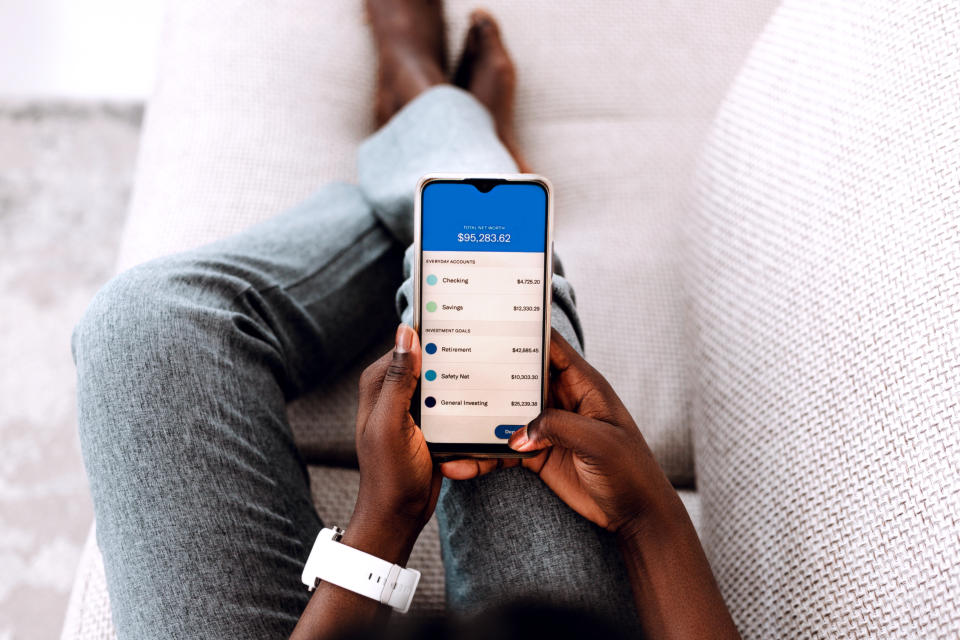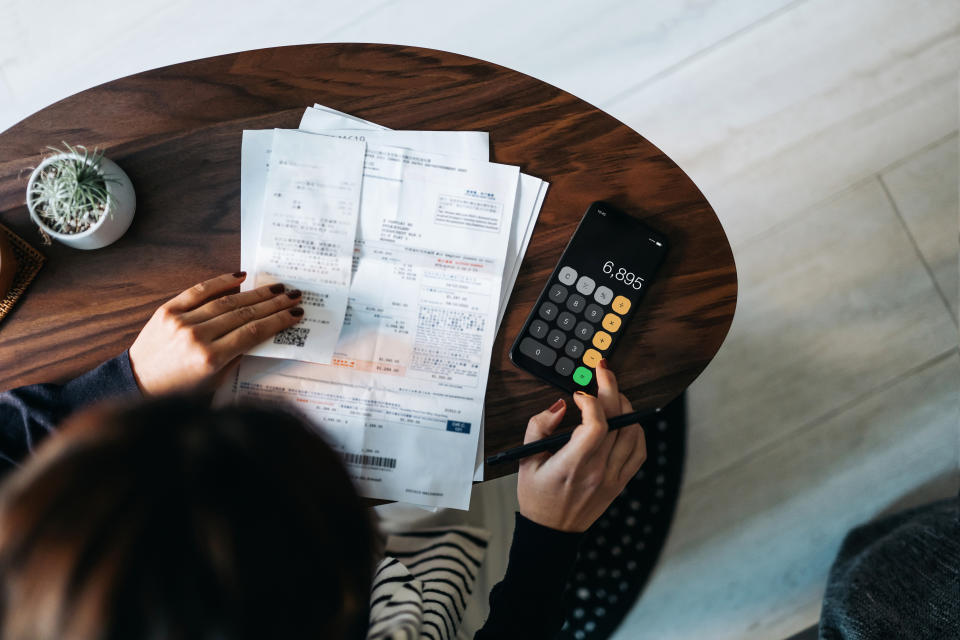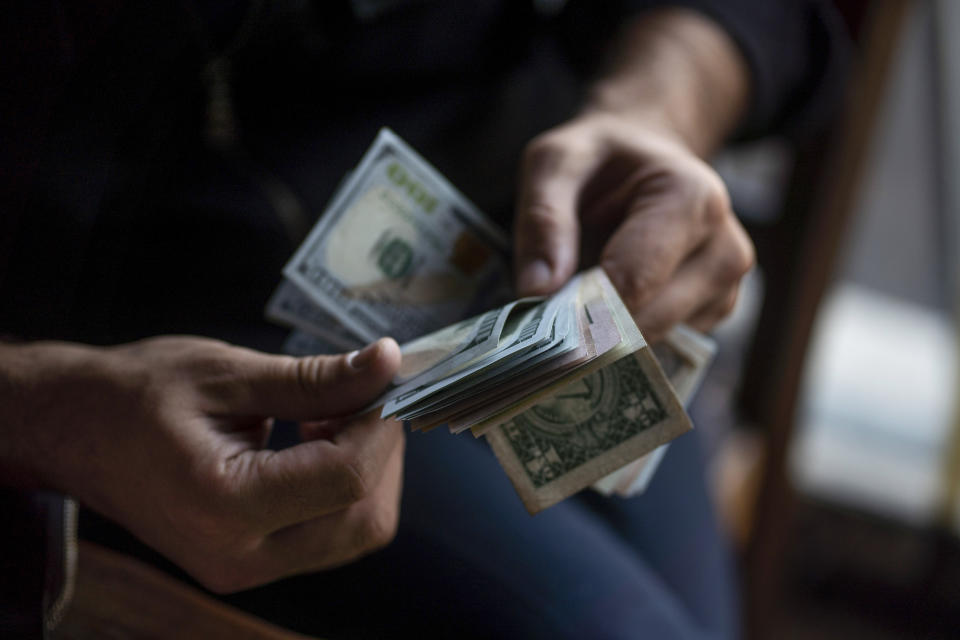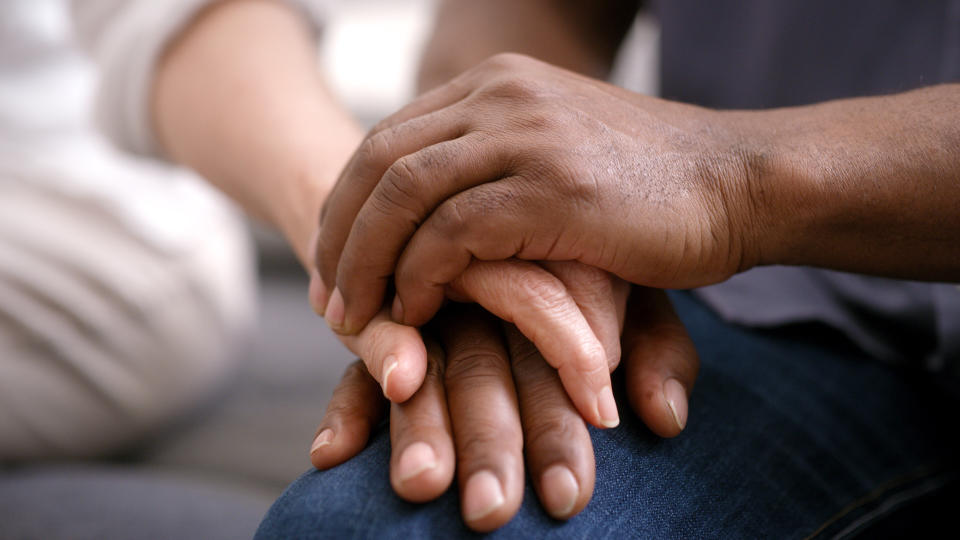"If Your Partner Is Doing This...": Here's What Experts Want You To Know About Financial Abuse

Financial abuse, within romantic relationships, occurs more often than people realize. Unfortunately, it's also a subject that's not widely discussed or can be difficult to identify.

According to the National Domestic Violence Hotline, 27% of people who self-identified as being in an abusive relationship also stated experiencing a form of financial abuse — and according to the same report, this number has grown during the COVID-19 pandemic and will continue to grow. Since 2016, the increase in survivors mentioning financial abuse as part of their experience has grown by an average of 13% annually.
Even though there has been an increase in awareness of what financial abuse is — which is the act when one or multiple partners use money as a way to gain power, manipulate, and control another — it's still considered one of the least-known forms of abuse.
This may be because most people consider the topic of money to still be taboo and don't discuss it openly within most relationships and/or because a person wasn't able to learn about money during childhood.
So to help define financial abuse, show what it might look like in a relationship, and learn how it's different from financial "red flags" or incompatibility, we talked to two experts:
The experts: Moraya Seeger DeGeare, MA, LMFT, a licensed marriage and family therapist and an in-house relationship expert at Paired.

Emily Irwin, managing director and senior director of advice, Wells Fargo’s Wealth & Investment Management.

According to DeGeare, a financially abusive partner will generally make money decisions without their S.O.'s consent. This behavior sets up an imbalance of power within the relationship that can be incredibly hard to change.
While some of the main ways they can do this are by limiting access to finances or financial information — including the ability for a partner to have their own funds and control of money needed to sustain a functional everyday life — DeGeare also provided a few other examples of what financial abuse can look like within a romantic relationship below:

? If you have no personal history or reason for you can not be trusted with having access to money, and yet you are not allowed to have any autonomy over your finances, this is a sign that this could be due to your partner intentionally using money for control.
? You have no say over your budget, especially without any history of overspending.
? If you are unaware of the financial needs to have your life functioning, and when you want to learn more, you are directly blocked from knowing more or having access to any further information. Your partner is intentionally using money and limiting your financial knowledge in a way to make it so you will continue to depend on them.
? If any conversation about finances is dismissed immediately.
? One or both partners are physically or emotionally violent with a partner surrounding spending habits and conversations about money.
? When you earn money and your partner demands it. Your partner spends the money you earn and you have no say in it.
? Consistent unexplained financial behavior from a partner.
? Uses funds or credit cards to excess without behind your back.
? Expecting you to take care of them financially without agreeing on it. Living in your home and refusing to contribute to the household.
Since there could be a myriad of reasons why someone may become financially abusive to their partner, DeGeare said, "At the base of abuse, harm, and violence is disconnection, trauma, and something that happened to this person."

"If someone has such an overwhelming need to control another person, their world must feel like a very scary and out-of-control place. Financial abuse can also co-occur when someone is navigating another diagnosis such as addiction or major mental health disorder," she said.
But even if you fully understand the deeper motivation behind the abuse and have empathy for it that doesn't mean you have to stay while your partner works on healing those parts of themselves, DeGeare emphasized.
The truth is financial abuse breaks down trust and safety in relationships. "It can lower self-esteem for one or both partners, too," DeGeare said. So to avoid this and have a healthy relationship, "you need to have and engage in honest communication," she added, "but if one partner is using money to control the other, it takes away the ability to have healthy communication around a key aspect of every relationship."

But how does one identify if the communication issue surrounding money actually stems from abuse versus someone having a "red flag" behavior? Well, according to DeGeare, it's important to talk about culture, religion, gender, and the intersectional aspects of identity to properly identify the difference, since so many relationship patterns are built from what we've seen around us as children.

"Many couples enter into relationships with financial values that are heavily aligned with gender roles when it comes to finances, even when it does not fully align with who they are in their life," she explained.
For instance, DeGeare said, "If one partner grew up in a home where their father always handled the finances and their mother organized other family responsibilities, that can come from how their parents were raised and what was considered normal." She continued, "However, if the other partner had been raised by two moms who had finance meetings every week, then you start your marriage at very different places than what is expected for a healthy relationship."
Many of us grow up without learning much about money at home or school (or just the stressful parts). DeGeare says that this lack of financial education can lead people to exhibit financial behaviors that don't quite rise to the level of abuse but still can be seen as "red flags."

Of course, this doesn't negate the fact that it's the responsibility of the person to eventually learn how to manage finances if their living situation allows it, especially if they plan on combining their finances with a partner. However, if they choose not to connect with their partner to work through their "financial responsibilities," this can be a form of financial abuse as previously mentioned by DeGeare.
That's why Emily defines a "financial red flag" as an: "undesirable characteristic or pattern of behavior relating to any aspect of finances that serves as a warning that you and your partner may not be financially compatible."

Emily provided some examples of what "financial red flags" may look like:
? "Financial secrecy, which is essentially refusing to talk about your financial picture and goals, is the most alarming financial red flag. If your partner is unwilling to openly discuss their overall financial situation with you, this can be problematic because trust and honesty are the foundation of any healthy relationship," she said.
? "Unattractive frugality manifests itself when your partner has made plenty of money, but is extremely tight with money. For example, refusing to tip the waitstaff or Lyft driver. At this point, it’s not about the money; rather, it’s about the fact that you and your partner may not share similar values," she said.
? "The assumption that making more money in the relationship equals power. This unequal perception of power may affect where you live, what you do for fun, and with whom you spend your time," she explained. "You want an equal voice in the relationship irrespective of who makes more or less, or who’s family has more or less. Interestingly, the flip side also has some risk, where the partner who makes less money assumes the person who makes more will pay time and time again. Over time, guilting one partner into picking up all the expenses can lead to feelings of resent."
While "financial red flags" might not be on the same level as financial abuse, Emily explained that they can indicate other problem areas within the relationship, such as lack of commitment, lack of honesty, or even incompatibility based on values and goals, no matter the length of the relationship.
For instance, Emily said that while an in-depth conversation about finances may not be a first-date talking point, it’s important to share financial information when the relationship becomes more serious.

So, if you're in the early stages of a relationship and you want to identify if they have any financial red flags, Emily said to "take notice of how your partner handles conversations about business and career goals, observe if there’s always an over-the-top willingness to pick up an extravagant evening or a noticeable exit every time the bill lands on the table, and be wary if there’s a cavalier attitude towards debt."
However, if you're open to asking your partner how they feel about money, Emily provided a few questions you can ask below:

1. Tell me about how your parents (or others) taught you about money. What lessons did you learn from observing them?
2. What’s your most vivid money memory?
3. What’s your current financial situation? How does that affect your everyday lifestyle?
4. What are your goals? What’s your timeline, and what’s your plan to achieve them?
5. How did you fund your education? Save for your current home, apartment, or car? What types of hobbies do you enjoy? What’s a wish-list experience for you?
6. Is there anything that makes you frustrated when it comes to money?
7. How has your perspective on saving, spending, and debt evolved over the years?
"Questions like these help you understand the values that your partner associates with money and the influence that money has on short- and long-term decision-making," Emily explained. "These discussions will highlight what experiences shaped your partner’s relationship with money, how they prioritize their own financial goals, and if there’s an action-oriented mindset. You may also discover that you’re lock-step or completely out-of-step regarding your financial philosophies."
On the other hand, if you and your partner have been in a long-term relationship and you both have difficulty talking and managing money together from a "financial red flag" standpoint, Emily suggested setting aside time regularly (at least once a month) with each of you knowing that finances are on the agenda.

"During this time, you can review your income, spending, and any debt together," Emily said. "Check-in regarding goals, such as saving for a home or target retirement date, and other life changes that may be affecting your finances, such as a change in career or a new baby."
As for longer-term goals, Emily said to plan to have a more robust conversation at least annually. "Have an agreement of what constitutes a major purchase, and set expectations about when you expect the financial decision to be jointly made," she said.
While many couples have a “CFO” in their relationship, Emily said it’s important that both parties have a solid understanding of the overall financial picture.
Even though this all comes down to communication and what aligns with a person's values, it's important to remember this may not work if one partner forcibly has full control of the household finances. So if you believe you are in a financially abusive relationship, Degeare suggests reaching out and talking to a trusted person in your life, like a friend, family member, coworker, or therapist.

"One of the biggest things that happens in abusive relationships is isolating one or both of the partners," she said. "The shame of the situation often keeps people stuck in it and experience more harm. Remember: you are not in this alone."
If you're in need of support, here are a few resources that will help those in domestic violence situations:
- The National Domestic Violence Hotline
- RAINN
- National Network To End Domestic Violence
Have you experienced financial abuse? If you're comfortable sharing, tell your story in the comments below:
If you or someone you know is in immediate danger as a result of domestic violence, call 911. For anonymous, confidential help, you can call the 24/7 National Domestic Violence Hotline at 1-800-799-7233 (SAFE) or chat with an advocate via the website.
The National Alliance on Mental Illness helpline is 1-888-950-6264 (NAMI) and provides information and referral services; GoodTherapy.org is an association of mental health professionals from more than 25 countries who support efforts to reduce harm in therapy.